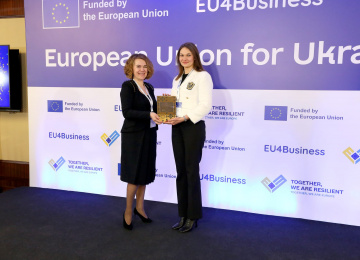
With support from the European Union, Ukraine is implementing a major deregulation reform from 2023 to 2025 — a reform that is changing the rules of the game for entrepreneurs. Instead of endless permits, approvals and inspections, the country is introducing transparent digital tools and simplified procedures. These changes are set to empower Ukrainian businesses to operate more actively and stimulate the economy during the full-scale war.
From Chaos to Clarity
Over 1,300 regulatory documents have been reviewed by the Interagency Working Group for the Accelerated Review of State Regulation Instruments (MPG) since the start of its work. The Better Regulation Delivery Office (BRDO) has joined the MPG’s efforts through the EU4Business: SME Policies and Institutions Support (SMEPIS) project. This project is implemented by Ecorys in consortium with GIZ, BRDO, and Civitta and funded by the European Union.
BRDO experts are directly involved in analysing regulatory acts and drafting legislative reforms. As a result, more than 300 excessive or outdated business regulations have already been repealed. And this is just the beginning.
One of the most tangible changes for entrepreneurs has been the elimination of long-standing mandatory procedures and paperwork that created artificial barriers to day-to-day operations. These include the cancellation of sanitary certificates, certain product authorisations, outdated assessments and approvals, along with streamlined requirements in construction, agriculture, trade, and labour protection.
One More Step Towards a Business-Friendly Environment
Ukraine has also launched the digital permit platform "ePermit", providing a single online access point for licences and authorisations. This digitalisation effort speeds up decision-making, reduces human interference, and lowers corruption risks.
What Does This Mean for Businesses?
- Time and cost savings: Thanks to deregulation and digital services, businesses can save up to UAH 21.3 billion in administrative costs.
- Transparency and predictability: Entrepreneurs can check the status of permit applications, file requests or appeal decisions online — all via the ePermit platform.
- Fewer corruption risks: Digital processes reduce human interference, minimising the potential for abuse.
Business owners no longer have to run from office to office or rely on ‘connections’. Some decisions are now made automatically based on clear, open criteria, with set deadlines for submission and review.
These reforms not only help businesses optimise administrative processes, but also reduce staff workloads and cut operational costs — a vital lifeline during wartime and the post-war recovery.
What Is Business Saying?
In 2024, BRDO surveyed more than 800 businesses across Ukraine. The biggest barriers identified were:
- VAT invoice blocking — 50% of respondents
- Border logistics delays — 27%
- Abuse of regulatory powers — 25%
- Violations in tender procedures — 21%
- Tax authority inspections — 19%
Still, the majority of business owners (70%) said deregulation has already had a positive impact on their operations, with a further 20% expecting even greater benefits in the coming years. The most notable improvements have been in licensing and sanitary inspections.
The government is not just clearing out old rules — it's building a more breathable environment for businesses. What used to take six months for a permit can now be done online in a matter of days, saving both money and nerves.
In the long run, this means more room for growth: Ukraine can improve its international rankings and become more attractive to investors — especially in sectors serving both domestic and export markets. This also means more jobs, particularly in small businesses, and deeper integration into the European market through harmonised regulations.
What’s Next?
In 2025, the second wave of deregulation was launched.
“Effective regulation isn’t just about less paperwork. It’s primarily about clear and fair rules that actually work for businesses. Streamlined procedures save time and money and help resolve stakeholders’ issues quickly. Business is the engine of the economy — and our goal is to ensure that government involvement truly helps solve problems while creating minimum burden for entrepreneurs,” says Oleksii Dorohan, Executive Director of BRDO.
Planned next steps include further digitalisation of permits and alignment with EU practices: integrating into European digital systems and adopting shared safety and quality standards.
“In April this year, the Government repealed over 200 outdated regulatory instruments — and that’s just the start. We’re moving towards a full clean-up of the regulatory landscape, including legislative reform. We are truly grateful to the European Union and its institutions for their comprehensive support — both technical and expert. Thanks to this cooperation, Ukraine is introducing modern, transparent and effective mechanisms for state-business interaction,” highlights Tetiana Berezhna, Deputy Minister of Economy of Ukraine.
The EU’s support in this process is critical — providing not only financial and expert assistance, but also enabling Ukrainian reformers to follow Europe’s best practices adapted to the national context.






